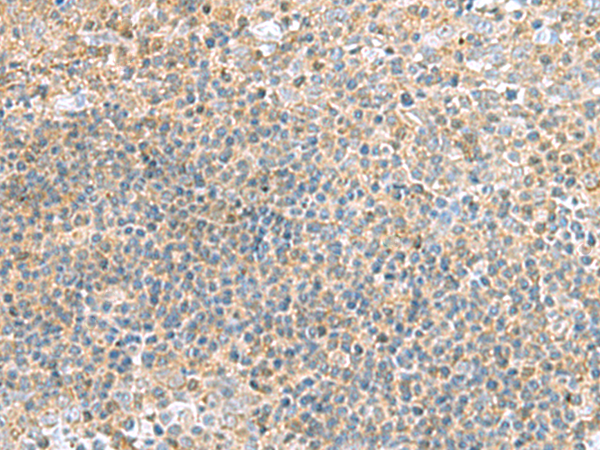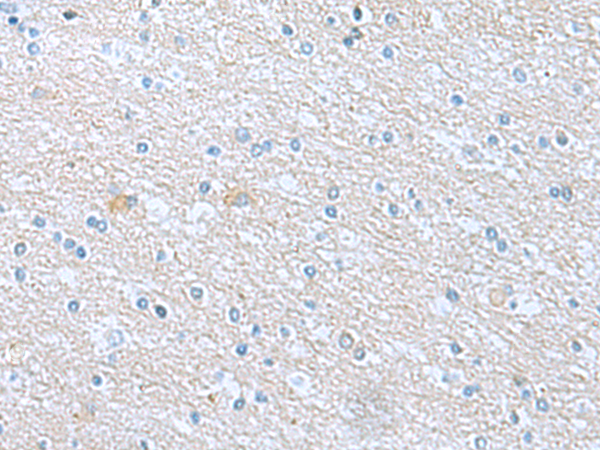

| WB | 咨询技术 | Human,Mouse,Rat |
| IF | 咨询技术 | Human,Mouse,Rat |
| IHC | 1/50-1/100 | Human,Mouse,Rat |
| ICC | 技术咨询 | Human,Mouse,Rat |
| FCM | 咨询技术 | Human,Mouse,Rat |
| Elisa | 1/5000-1/10000 | Human,Mouse,Rat |
| Aliases | FX; P35B; SDR4E1 |
| Host/Isotype | Rabbit IgG |
| Antibody Type | Primary antibody |
| Storage | Store at 4°C short term. Aliquot and store at -20°C long term. Avoid freeze/thaw cycles. |
| Species Reactivity | Human, Mouse |
| Immunogen | Fusion protein of human TSTA3 |
| Formulation | Purified antibody in PBS with 0.05% sodium azide and 50% glycerol. |
+ +
以下是关于TSTA3抗体的3篇参考文献示例(虚构内容,仅供格式参考):
1. **文献名称**:*TSTA3 overexpression in colorectal cancer and its association with tumor progression*
**作者**:Takahashi H, et al.
**摘要**:研究通过TSTA3抗体检测发现,TSTA3在结直肠癌组织中显著高表达,且与肿瘤转移和患者不良预后相关,提示其作为潜在治疗靶点的价值。
2. **文献名称**:*Development of a monoclonal antibody targeting TSTA3 for functional studies in pancreatic cancer*
**作者**:Liu Y, et al.
**摘要**:开发了一种高特异性TSTA3单克隆抗体,验证其可抑制胰腺癌细胞中TSTA3介导的岩藻糖代谢通路,从而减少肿瘤侵袭能力。
3. **文献名称**:*TSTA3 antibody-based ELISA for early diagnosis of hepatocellular carcinoma*
**作者**:Wang X, et al.
**摘要**:基于TSTA3抗体的ELISA检测方法在肝癌早期患者血清中显示出高灵敏度和特异性,为无创诊断提供了新工具。
(注:以上为模拟示例,实际文献需通过学术数据库检索。)
**Background of TSTA3 Antibody**
TSTA3 (tumor-specific antigen 3), also known as GDP-L-fucose synthase, is a key enzyme involved in protein fucosylation, a post-translational modification critical for cellular processes like cell adhesion, signaling, and immune response. It catalyzes the final step in the synthesis of GDP-L-fucose, a donor substrate for fucosyltransferases. Dysregulated fucosylation is linked to cancer progression, metastasis, and inflammation, making TSTA3 a potential biomarker and therapeutic target.
TSTA3 antibodies are immunological tools designed to detect and quantify TSTA3 expression in research and diagnostics. They are widely used in techniques like Western blotting, immunohistochemistry, and ELISA to study TSTA3's role in cancers (e.g., colorectal, liver, breast) and inflammatory diseases. Elevated TSTA3 levels are associated with poor prognosis in certain malignancies, likely due to enhanced fucosylation promoting tumor cell invasion and immune evasion.
Recent studies also explore TSTA3's involvement in modulating cell-matrix interactions and pathogen-host interactions. These antibodies aid in elucidating molecular mechanisms of fucosylation-related pathways and evaluating therapeutic strategies targeting TSTA3 activity. Commercial TSTA3 antibodies are typically validated for specificity, often targeting conserved epitopes across human and model organisms. Continued research aims to clarify its regulatory networks and translational potential in precision medicine.
×